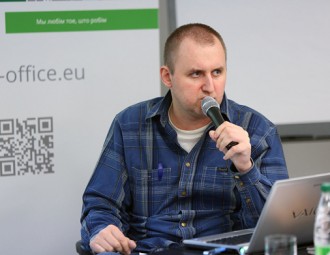Yauhen Shauko: Needs of people with disabilities must be taken into consideration by business

Chairman of the Belarusian National Association of Disabled Persons in Wheelchairs, described the advantages of the CSR strategies in the barrier-free environment.
Do Belarusian businesses take into account the needs of disabled persons? How "accessible" are private goods and services? Why is employment of people with disabilities beneficial and what jobs are most often offered to disabled people? ODB talked about it with Yauhen Shauko, author of the "Accessible City" project, and Chairman of the Belarusian National Association of Disabled Persons in Wheelchairs.
- What is the Accessible City project?
- The goal of this project is to raise awareness about "accessible" goods and services for the disabled in the urban environment: we are creating an online map, where we mark shops and other objects and analyze their "physical" accessibility for people with disabilities. We launched the Accessible City in winter after a long preparatory period: we had to work on the website, project structure, information acquisition; we trained people on various aspects of the barrier-free environment, we organized specialized courses and developed a handbook on barrier-free environment.
The Accessible City project is implemented by the National Association of Disabled Persons in Wheelchairs in cooperation with volunteers. The website with the online map has now been adapted for mobile devices: site content can be added with the help of a smartphone or a tablet. Anyone can fill in an online application, our specialists will analyze the data and determine whether an urban object is "accessible" or "inaccessible" for people with disabilities. Also, within the framework of this project any private company can now implement a corporate volunteering programme for their employees. We also held a We Are Accessible for Everyone! sticker design contest to brand doors of commercial and other places that are accessible for people with disabilities.
Today the situation is quite deplorable: the percentage of places that we consider to be accessible is quite small. In the best-case scenario, one out of 20-30 places can be deemed accessible. We now plan to gather all information on barrier-free environment on the website Freeway.by: this informative resource, intended for those who are interested in this issue, has an accessibility map. At the moment we are focused on covering Minsk city. The map already includes the town of Mazyr, where we did measurements in 2010 on the M1 highway, and now Babruisk also wants to do measurements to create a pedestrian map.
Speaking about businesses that build new facilities (shops, etc.), the most important thing here is for them to think through their planned constructions well in advance, keeping in mind the need for barrier-free environment. Needs of people with disabilities must be taken into consideration every time, while now they are usually looked upon as a mere formality. No one checks if the ramp is constructed correctly and is ready to be used. In the majority of cases we see ramps that do not conform to the Belarusian requirements because people do not take this issue seriously. We have the "global" campaign for the barrier-free environment, people want their properties to conform visually and construct ramps without thinking.
- Do Belarusian businesses give proper consideration to people with disabilities?
- Speaking about employment, in the past few years more job offers have appeared for the disabled. However, these mainly deal with distance work. For example, we get job offers for consultants who could provide information to online customers about the range of goods on a website.
- So, these job offers are intended for people who are already "isolated" at home?
- Yes, there are not many organizations who give consideration to creating a barrier-free environment. When people with disabilities face barriers - leaving the house, getting to workplace, moving about in the workplace - they become demotivated very quickly, so the issue of barrier-free environment is a priority one.
If we take a look at the job centers, people with disabilities are offered jobs that are poorly paid and not prestigious: watchmen, guards, etc. However, when a disabled person receives employment through the job center, the employing company can receive a subsidy to furnish their work space. This money can be used to purchase another equipment, convert something in the office. Also, if a disabled person is registered in the job center, then their employment contract can be made in the job center, and they will pay the person's salary for six months. Thus, the company can "save" on their salary. If the company is happy with this employee, six months later they can enter into a new employment contract with their employer.
- Is there any compensation provided to companies that employ people with disabilities?
- Employees with disabilities receive income tax benefits. As for organizations and companies, the amount of taxes and contributions will be lower if 50 % of their employees are disabled, otherwise, unfortunately, they do not get any benefits.
- What advice would you give to companies who wish to implement a CSR project on the barrier-free environment?
- If the company wants to get help from us, we can provide them with a free consultation on how to become accessible, we can give them recommendations and explain how they can create conditions suitable for different groups of customers, such as the elderly, parents with baby prams or people with disabilities, to create more accessible places in the city.
-
03.01
-
07.10
-
22.09
-
17.08
-
12.08
-
30.09



























